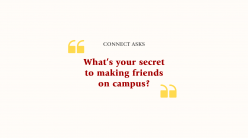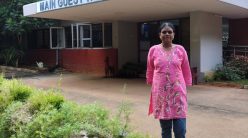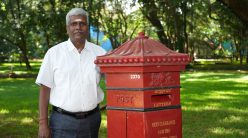A group called Queer and Straight Allies at IISc is working to support LGBTQ+ students
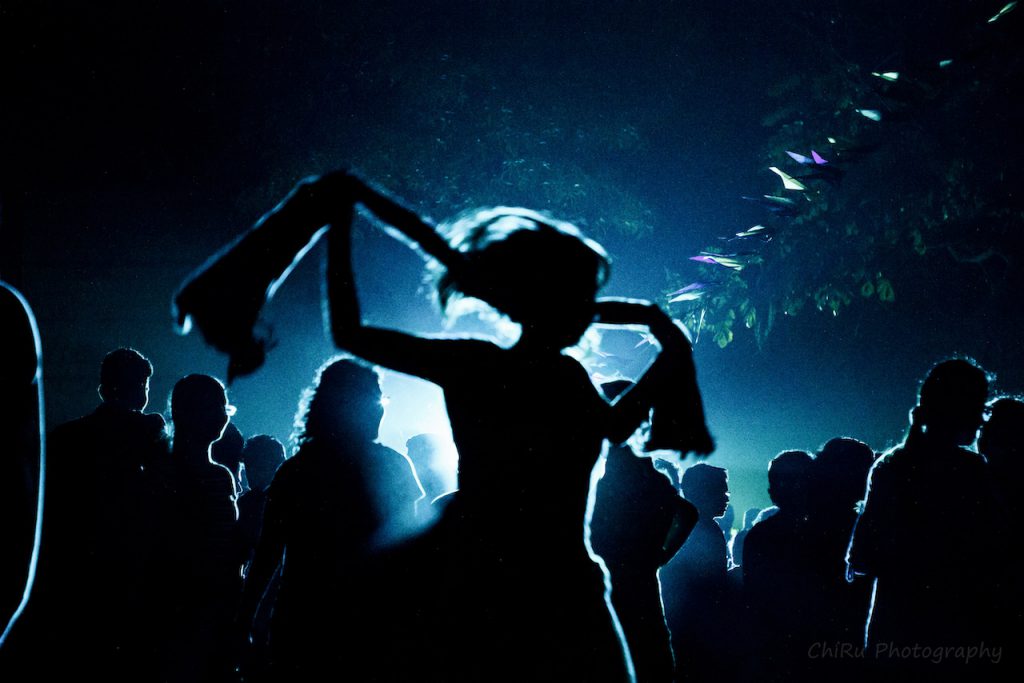
“I had read about IISc having a queer group before I came here,” says Anwesha, an MTech student. “I was excited to meet people whom I could relate to as I didn’t have any queer friends before that.” Anwesha says that it can be demotivating not to have friends you can openly share experiences with. “There was also some apprehension because I hadn’t been so open about my sexual orientation before this, and I was a bit scared to come out to so many people.” But her fears were put aside when she became a member of a student initiative called Queer and Straight Allies at IISc (QUASI). “QUASI gave me a platform to express myself without judgement from outsiders,” she says.
Like Satrangi at IISER Pune, Saathi at IIT Bombay and Queerious at BITS, Goa, QUASI is one of several support groups at educational institutes in India which came to the forefront after the Supreme Court decriminalised homosexuality in 2018. Although there had been an unofficial group exclusively for queer students called QueerIISc for several years, and a version of QUASI had been around since 2015, QUASI was able to gain visibility only after 2018. It now advocates on a broader platform for students who identify as queer or LGBTQ+ (lesbian, gay, bisexual, transgender, queer, and the ‘+’ stands for other identities within this umbrella including intersex and asexual). QUASI’s stated vision is to “make the campus an amiable and inclusive space for the whole queer community by acting as a platform for raising awareness about sexual and gender diversity.” Its membership is also open to students of the Jawaharlal Nehru Centre for Advanced Scientific Research (JNCASR), the National Institute of Advanced Studies (NIAS) and the National Centre for Biological Sciences (NCBS).
One of the people who worked to make QUASI visible is PhD student Ezaz Ahmad Siddique, who was also a member of the Empaths – a student peer support group for mental health. “During this time, I came across queer students who felt like they didn’t fit in anywhere. They craved a space where they could meet people with similar experiences and be themselves,” he says. This prompted him and a group of friends to think about popularising QUASI, which at that time was in the form of a Facebook group and a mailing list.
“I came across queer students who felt like they didn’t fit in anywhere. They craved a space where they could meet people with similar experiences and be themselves”
The group conducted surveys among the students of IISc in 2018 to find out how many queer people there were on campus and how comfortable they felt talking about this aspect of their identity on campus – 108 people replied. More than half of them said they were LGBTQ+ individuals, and of this number, 60 percent said they did not find the campus to be queer-friendly. A similar number said they were wary of ‘coming out’ (revealing that they were queer) to others on campus and in their workplace. Siddique highlights several anecdotes he has heard about bullying on the basis of people’s sexual orientation. He says, “We also wanted there to be a body which queer students could approach if they were being harassed on campus.” All these factors convinced this group of students to approach the Students’ Council and step up QUASI’s activities, so that they could engage both queer and straight allies in order to provide a support system for LGBTQ+ people on campus.
Why do queer students need support?
Some queer students that CONNECT spoke to mentioned that they faced discrimination in different forms, sometimes as homophobic remarks about their behaviour, characteristics or even something as simple as the length of their hair, and whether or not they were open about their identity. “In the past, students and teachers have mocked the way I speak or walk. One of the professors even told me to ‘stop doing Bharatanatyam’ when I spoke. This made me extremely conscious about the way I spoke or walked, and I started focusing on that while making presentations or during meetings,” Siddique elaborates.
Sometimes, the discrimination goes beyond mockery – in 2015, an IISc student was targeted by a blackmailer who threatened to ‘out’ him as gay to his peers and supposedly ruin his career if he didn’t pay up Rs 5,000. When the student didn’t pay, the blackmailer followed through with the threat, posting abusive notices about his sexuality on the hostel notice board.
While discussing the problems faced by queer students on campus, Dr Vyjayanthi Subramanian, consulting psychiatrist at IISc’s Health Centre and former Associate Professor at MS Ramaiah Medical College, says, “IISc has students on campus as young as 18 years old, which is around the age a lot of queer individuals discover their sexual orientation.” She adds that discovering one’s sexual identity has been daunting for a large number of the queer students that she has interacted with, many of whom come from conservative family backgrounds. “This discovery often clashes with their cultural background and leads to a crisis situation, and they find it difficult to come to terms with it.” She has also observed a number of mental health issues, like anxiety and panic disorders and occasional self-harm, crop up among queer students due to social isolation and the prolonged stress of discrimination and bullying.
However, she says that in the last six years that she has worked at IISc, she has observed a change for the better. She believes that queer people at IISc have more of a support system now than in the past, and credits QUASI for this.
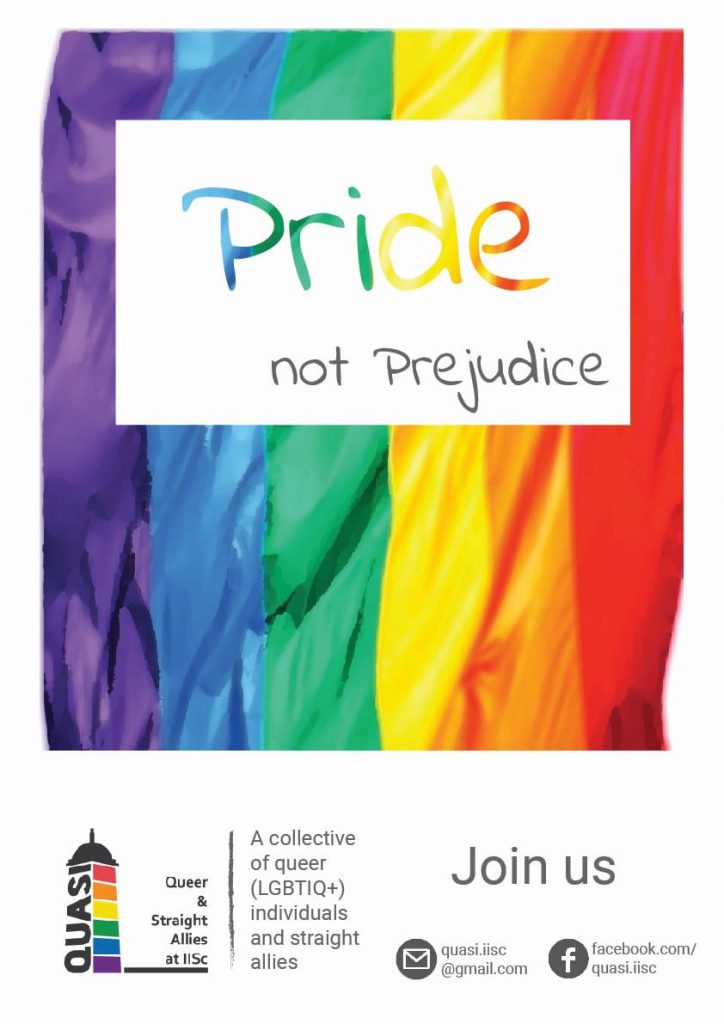
Arnav*, a queer undergraduate student, agrees that QUASI provides strong support. He says a few of his batchmates made homophobic jokes and comments in person and on a WhatsApp group, which left him feeling hurt. After Arnav discovered QUASI at a film screening on campus that they organised, he was able to tell them about the problems he was facing with his batch and they helped him deal with it, he says. “Senior members of QUASI even stepped in and contacted the admins of the WhatsApp group to ensure that this did not happen again.”
Gourav Tarafdar, a former member of QUASI who completed his PhD from IISc in 2019, also says he has seen positive changes over the years that he was at the Institute. He explains this with an example, “It often happens that a queer person may be at the canteen with his colleagues, when one of them uses a homophobic slur. It’s not always easy for a single individual to stand up and fight with their labmates or peers. But QUASI coming to the forefront has helped to negate those effects, since people are speaking about the LBGTQ+ community and standing up to homophobia more openly. You get to see that not just queer friends, but also many straight allies support you, and this has been a good change in the last few years.”
Building a community
Tarafdar says he wasn’t completely ‘out’ about his sexual orientation when he joined IISc, but at the end of five years, QUASI helped him come out of his shell. “You get to see other students who are queer and comfortable in their skin, and to a person newly joining the campus, it acts as a support group, especially for someone new to the city.” The opportunities for interaction come with events organised by QUASI such as screenings of movies, short films and documentaries that tell stories of the queer community. They also organise talks by members of the queer community, such as one held in 2018 with Saniya Sood, a transgender woman who was the runner-up at Miss Transqueen India 2018, as the speaker.
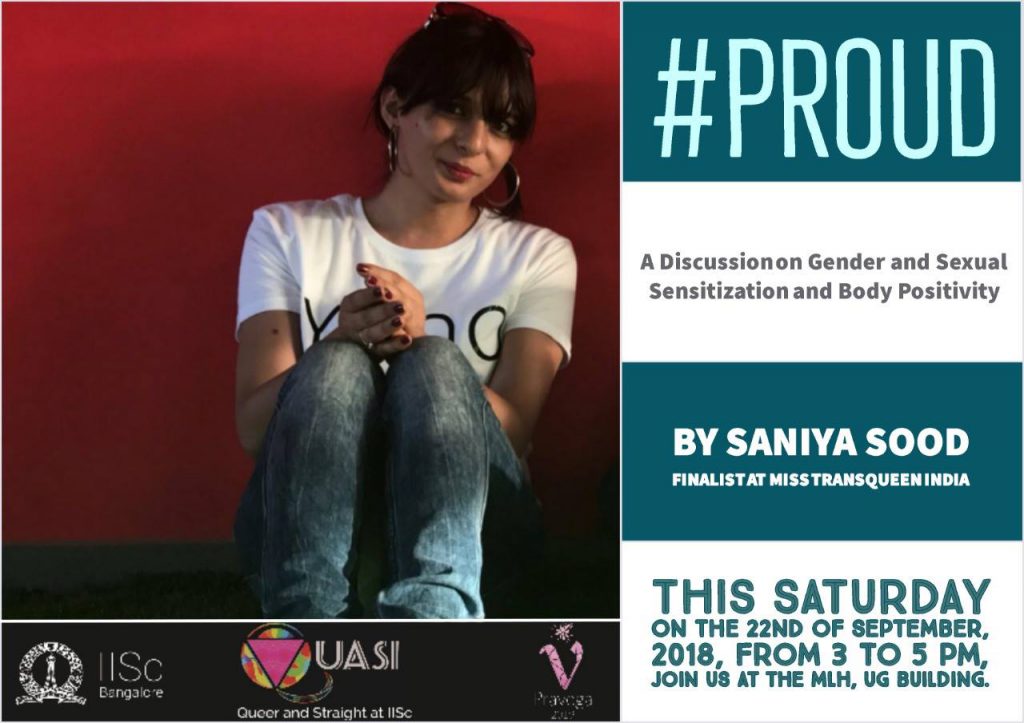
Such events have set many conversations about gender and sexuality in motion, and have helped straight as well as queer students learn more about the queer community. “By hearing about shared experiences of being sidelined and the trauma that others in the queer community face, I realised that I wasn’t alone. I also got to know about the experiences of queer women, which I wasn’t aware of earlier,” says Nikhil*, an undergraduate student. Arnav adds, “I learned a lot about the spectrum of sexuality and about the spectrum of gender. I was living in a bubble when it came to gender, but QUASI opened my eyes to the various aspects of it.”
Straight allies are also learning how to help create a more comfortable environment for their queer peers. Some say that they have learnt to be more empathetic and supportive of queer students. One student said that she tried to educate labmates who claimed that homosexuality is ‘against tradition’, by explaining how deeply intertwined the spectrum of sexuality and gender is with Indian culture.
QUASI’s presence is only growing – in 2019, they were given permission to introduce themselves at the orientation for students at IISc. This was a big step for them as it was their first formal introduction to new students. Gaurav Solra, who was the General Secretary of the Students’ Council in 2018, says, “New students approached us to say that they feel comfortable and safe on campus. It is good to know that QUASI is creating a good support system for the new students.”
QueerIISc, which is a group under QUASI’s banner and only for people who are queer, also acts as a safe space for them on campus. Before the COVID-19 pandemic hit, this group used to meet regularly every Sunday, and since the beginning of the pandemic, they have online meetings where they play games, talk about their week and any events of significance. “Apart from sharing experiences about facing discrimination and other problems, we also had fun playing games and talking about happier stories, right down to our childhood crushes,” laughs Nikhil.
“We have received a large number of SOS calls from [queer students] because some families wanted to subject them to ‘conversion procedures’ using ‘black magic’, poojas, and in some cases, even medication”
Unfortunately, the pandemic and subsequent lockdowns have hit several queer students hard. “All the students were sent home due to the lockdown, and we have received a large number of SOS calls from many of [the queer students that she was in contact with] because some families wanted to subject them to ‘conversion procedures’ using ‘black magic’, poojas, and in some cases, even medication. This led to a lot of anxiety for many of [them], which was very worrisome,” says Dr Subramanian. She adds, “Almost all the queer students I’ve spoken to mention that they miss the camaraderie and sense of family and belonging that they feel on campus that has been created by QUASI. It acts like an oasis of comfort for them.”
Like QueerIISc, QUASI has had to adapt to the pandemic. Since organising in-person outreach activities is now difficult, QUASI has started an initiative called the ‘Coming Out Diaries’ on their social media pages where people share their experiences of revealing their queer identity to others. “[These stories] have struck a chord among the queer community at IISc and helped to let them know that they aren’t alone,” says Siddique. In addition to organising events and functioning as a support group, the website and social media platforms of QUASI direct people to resources like the iCASH committee to address sexual harassment complaints, and the IISc Wellness Centre and YourDOST for mental well-being.
Institutional change
Some queer students and alumni say that there is still a long way to go to make IISc a safe space for the community, which is why sustained conversations remain necessary. Bittu KR, who studied at IISc from 2010 to 2013 and is currently Associate Professor of Biology and Psychology at Ashoka University, says that when he joined, there was only one other person who was openly queer. But by the time he left, as a result of QueerIISc encouraging conversations and supporting the queer community, around 10-15 people were ‘out’.
Bittu, who is a transgender man, points out that without conversations about gender and sexuality, the default narrative is heteronormative. Bittu also says that queerphobia in the country largely revolves around the pressure on people to not talk about these things. Dr Subramanian agrees, “People have a ‘conformity bias’ and tend to presume that non-conformity threatens cohesion of a group. Since heterosexuality is considered to be the norm, many LGBT individuals are subjected to emotional abuse for not conforming to the norm.” Bittu adds, “The main idea behind encouraging conversations about gender and sexuality [in an educational institute or work environment] is that when there are conversations about how one’s life intersects with one’s work, one shouldn’t feel any barrier towards talking about the particularities of one’s life.” He also emphasises that conversations about gender and sexuality are important to implement necessary changes in policies at educational institutes against all forms of discrimination. “Without it, it makes places that only privileged people can comfortably inhabit. This is something that needs to change,” he says.
Conversations about gender and sexuality are important to implement necessary changes in policies at educational institutes against all forms of discrimination
Bittu calls attention to the need for making educational institutes a safe space for transgender people as well. He says that if and when transgender students come out to the university, they should be provided with housing in hostels that correspond to their gender, safe access to gender neutral washrooms or those that are allocated to the gender they identify with. “While a student transitions, it is important that they can operate in a framework where past and current publications, certificates and other documentation are accepted as belonging to the same person, and should be issued in their name of choice and their gender identity,” he highlights. “Trans people aren’t safe in most spaces, so there must be explicit inclusions for trans people in comprehensive policies around gender and sexuality that every university needs to have in place.”
QUASI aims to bring about this inclusivity at IISc. They are currently in talks with the administration to seek official recognition in ways such as being mentioned on the IISc website. They hope that such visibility can spread awareness within the Institute and lead to measures that ensure the comfort and safety of queer students at IISc, so that they do not face any discrimination. Anwesha says wistfully, “Maybe someday in the near future, I’d like to walk down the IISc roads holding hands with my partner without anyone judging us.”
*Name changed to preserve anonymity
Anoushka Dasgupta has a Master’s degree in Biotechnology from Savitribai Phule Pune University. She is interested in science writing.
